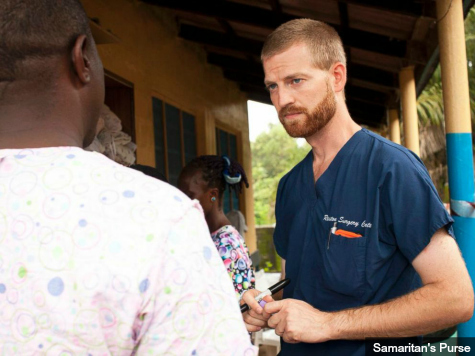
Ebola patients Dr. Kent Brantly and aid worker Nancy Writebol left Emory University hospital after doctors declared the two are not a public health risk. Brantly and Writebol contracted Ebola while treating patients in Liberia. Brantly spoke to the press before leaving the hospital. In a speech touching heavily on Christian themes, he lavished praise on God and those on Earth who treated him.
“Today is a miraculous day,” Brantly told the press. “I am thrilled to be alive, to be well and to be reunited with my family.
Brantly and his family moved to Liberia last October for a two year mission with the Christian organization Samariton’s Purse. He said the family chose the country “because God called us to help the people of Liberia.” The organization did not receive its first Ebola patient until June, but Brantly said everyone was prepared. He also sent his family back to the states, which allowed him to work harder with ill patients. Unfortunately, he received the virus despite the precautions.
“As I lay in my bed in Liberia the following nine days getting sicker and weaker each day, I prayed that God would help me be faithful even in my illness,” he said. “An I prayed in my life or in my death that He would be glorified. I did not know then, but have learned since that there were thousands maybe even millions of people around the world praying for me throughout that week and even still today.”
“I cannot thank you enough for your prayers and your support. But what I can tell you is that I serve a faithful God who answers prayers,” he said. “Through the care of Samaritan’s Purse and the SIM missionary team in Liberia, the use of an experimental drug, and the expertise and resources of the healthcare team at Emory Hospital, God saved my life. A direct answer to thousands and thousands of prayer.”
Brantly said he could not thank everyone personally, but decided to point out a few. The first was Samaritan’s Purse and the SIM team in Liberia because they helped him through the worst period in his life with the “love and mercy of Jesus Christ.” He then turned around to say thank you to the team at Emory’s isolation award. He thanked them for their warmth and compassion as he choke back tears. He also thanked them for helping him physically, but also spiritually. But his unselfish nature kicked back in and asked people to pray for those in Africa.
“Please do not stop praying for the people of Liberia and West Africa and for a quick end to this Ebola epidemic,” he said.
Writebol asked Brantly to share her statement to the press. She thanked everyone for their prayers. The first thing she said when she left the isolation unit was, “To God be the glory!”
He concluded his statement with more thank yous to Samaritan’s Purse, SIM, and Emory, but with the biggest thank you to God.
“Above all, I am forever thankful to God for sparing my life and I am glad for any attention my sickness brought to the plight in West Africa amidst this epidemic,” he concluded. “Please continue to pray for Liberia and the people of West Africa.”
On July 31, the experimental drug ZMapp arrived in Liberia, but Brantly insisted Writebol receive the drug. He opted to use a blood transfusion from a patient he saved.
“Yesterday, an experimental serum arrived in the country, but there was only enough for one person. Dr. Brantly asked that it be given to Nancy Writebol,” said Franklin Graham, president of Samaritan’s Purse. “However, Dr. Brantly received a unit of blood from a 14-year-old boy who had survived Ebola because of Dr. Brantly’s care. The young boy and his family wanted to be able to help the doctor that saved his life.”
However, it did not work. When the first vial of ZMapp thawed, Brantly accepted it since his health deteriorated faster. Writebol received the second dose once it was thawed. Both showed signs of improvement. Yet, Dr. Bruce Ribner, director of Emory’s infectious Disease Unit, said it is unknown if the drug played a part in the recovery.
“Frankly we do not know if it helped them, made any difference, or even delayed their recovery,” he said.
Ribner also said Writebol and Brantly are not a health risk. Since they survived Ebola, their bodies are immune to that specific strain of Ebola. There are only five strains of the deadly disease, four of which affect humans.

COMMENTS
Please let us know if you're having issues with commenting.